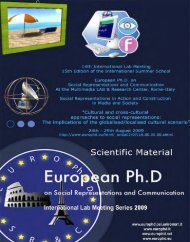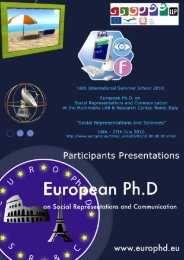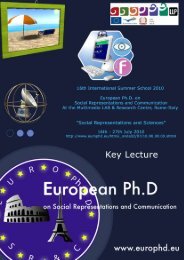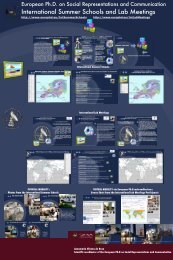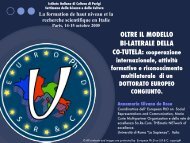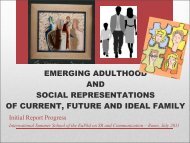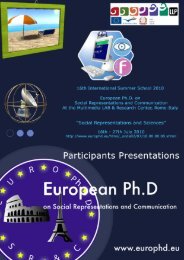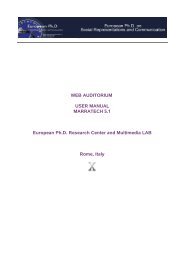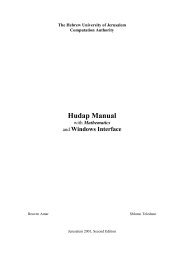The "boomerang" effect of the radicalism in discourse analysis
The "boomerang" effect of the radicalism in discourse analysis
The "boomerang" effect of the radicalism in discourse analysis
You also want an ePaper? Increase the reach of your titles
YUMPU automatically turns print PDFs into web optimized ePapers that Google loves.
A scientific dialogue or monologue?<br />
<strong>The</strong> purpose <strong>of</strong> this paper is to describe how <strong>the</strong> <strong>radicalism</strong> <strong>of</strong> <strong>the</strong> socio-constructionist<br />
<strong>the</strong>sis upheld by Discourse Analysis (RDA = Radical Discourse Analysis) may give rise to<br />
several hard-to-solve problems, which may be translated <strong>in</strong>to a boomerang <strong>effect</strong>.<br />
In carry<strong>in</strong>g socio-constructionist <strong>the</strong>sis to <strong>the</strong> extreme (moreover already put forward<br />
by o<strong>the</strong>r critical paradigms vis-à-vis <strong>the</strong> ma<strong>in</strong>stream <strong>of</strong> experimental social psychology<br />
and its decontexualised and non-historical approach to <strong>the</strong> study <strong>of</strong> social cognition), <strong>the</strong><br />
RDA has enabled a clear scientific identity <strong>of</strong> <strong>the</strong> researchers who are <strong>in</strong>spired by this<br />
paradigm to be outl<strong>in</strong>ed, mak<strong>in</strong>g <strong>the</strong>m immediately recognisable and clearly visible with<strong>in</strong><br />
<strong>the</strong> sphere <strong>of</strong> <strong>the</strong> scientific community.<br />
In uphold<strong>in</strong>g <strong>the</strong> ma<strong>in</strong> pillars on which socio-constructionism is based and which may<br />
be syn<strong>the</strong>sised <strong>in</strong> <strong>the</strong> anti-essentialist and anti-realist position, aim<strong>in</strong>g to make <strong>the</strong> most <strong>of</strong><br />
<strong>the</strong> historical-cultural and relativistic specificity <strong>of</strong> <strong>the</strong> knowledge (<strong>in</strong>clud<strong>in</strong>g <strong>the</strong>re<strong>in</strong> that<br />
are produced by <strong>the</strong> social sciences), centred on <strong>the</strong> language as a form <strong>of</strong> social action and<br />
pre-condition for <strong>the</strong> thought (and not vice-versa as <strong>in</strong> <strong>the</strong> traditional acceptance <strong>of</strong> <strong>the</strong><br />
language as expression <strong>of</strong> <strong>the</strong> thought), with a heavy emphasis on <strong>the</strong> <strong>in</strong>teraction and on <strong>the</strong><br />
social practices and, consequently, on <strong>the</strong> <strong>in</strong>teractive processes that create knowledge <strong>in</strong> <strong>the</strong><br />
negotiation <strong>of</strong> <strong>the</strong> social exchanges more than on <strong>the</strong> unchang<strong>in</strong>g cognitive structures, <strong>the</strong><br />
radical approach <strong>of</strong> "discursive" psychology may be summed up <strong>in</strong> <strong>the</strong> sentence "<strong>the</strong>re is<br />
noth<strong>in</strong>g outside <strong>the</strong> text".<br />
“A <strong>discourse</strong> about an object is said to manifest itself <strong>in</strong> texts - <strong>in</strong> speech, say a conversation or<br />
<strong>in</strong>terview, <strong>in</strong> written material such as novels, newspaper articles or letters, <strong>in</strong> visual images like magaz<strong>in</strong>es,<br />
advertisements or films, or even <strong>in</strong> <strong>the</strong> 'mean<strong>in</strong>gs' embodied <strong>in</strong> <strong>the</strong> clo<strong>the</strong>s people wear or <strong>the</strong> way <strong>the</strong>y do<br />
<strong>the</strong>ir hair. In fact, anyth<strong>in</strong>g that can be 'read' for mean<strong>in</strong>g can be thought <strong>of</strong> as be<strong>in</strong>g a manifestation <strong>of</strong> one or<br />
more <strong>discourse</strong>s and can be referred to as a 'text'.”<br />
(Burr, 1995, p. 50-51)<br />
Obviously - apart from <strong>the</strong> ma<strong>in</strong> pr<strong>in</strong>ciples <strong>in</strong> l<strong>in</strong>e with <strong>the</strong> zeitgeist <strong>of</strong> postmodernism<br />
and post-structuralism which affirms itself <strong>in</strong> opposition to <strong>the</strong> positivism and<br />
<strong>the</strong> empiricism dom<strong>in</strong>at<strong>in</strong>g <strong>in</strong> traditional science - <strong>the</strong> visibility acquired by <strong>the</strong> most<br />
radical exponents <strong>of</strong> DA is also <strong>the</strong> outcome <strong>of</strong> <strong>the</strong>ir specific rhetoric-communicative<br />
strategies (or practices as <strong>the</strong>y would prefer to say) not dissimilar from those used by <strong>the</strong><br />
"active m<strong>in</strong>orities", namely those based on a consistent communicative style, strongly<br />
stamped with paradigmatic (orthodox) coherence and by <strong>the</strong> group cohesion, with a<br />
contractual marg<strong>in</strong> <strong>of</strong> flexibility and <strong>of</strong> <strong>in</strong>ternal differentiation (here I am referr<strong>in</strong>g<br />
particularly to <strong>the</strong> Discourse and Rhetoric Group at <strong>the</strong> University <strong>of</strong> Loughborough, a rare<br />
example <strong>of</strong> <strong>the</strong> excellent academic team-work <strong>of</strong> brilliant researchers <strong>in</strong>clud<strong>in</strong>g Michael<br />
Billig, Derek Edwards, David Middleton, Jonathan Potter and Charles Antaki).<br />
Of course, <strong>the</strong>re are nuances tailored on <strong>the</strong> specificity <strong>of</strong> <strong>the</strong> <strong>in</strong>tellectual production <strong>of</strong><br />
each: among <strong>the</strong>se an attractive physiognomy is certa<strong>in</strong>ly assumed, for example, by<br />
Michael Billig's rhetorical approach. However one <strong>of</strong> <strong>the</strong> factors which characterises <strong>the</strong><br />
polemic style <strong>of</strong> <strong>the</strong>se supporters <strong>of</strong> discursive psychology, <strong>in</strong> its most radical versions, is<br />
<strong>the</strong> criticism addressed as much towards <strong>the</strong> classical experimentalism as to o<strong>the</strong>r<br />
paradigms <strong>of</strong> European social psychology (like that <strong>of</strong> "social identity" and <strong>of</strong> <strong>the</strong> "social<br />
3




